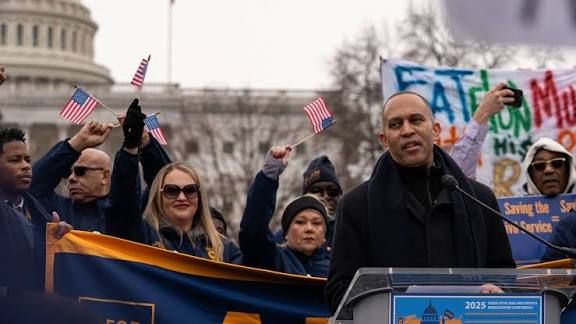Fury erupts on Capitol Hill: Democrats slam GOP over 43-day shutdown deal and looming health care shutdown

Tensions flared across Capitol Hill this week as lawmakers returned to Washington following the end of a historic 43-day government shutdown — the longest in U.S. history. While government operations are slowly resuming, the political fallout has left deep divisions, with Democrats furious over the final deal and Republicans accusing their counterparts of prolonging the crisis for political gain.
Democrats in the House say they were cut out of critical negotiations led by Senate Democrats and a small group of Republicans that ultimately produced the agreement to reopen the government. The compromise, approved by both chambers earlier this week, funds federal operations through January but fails to address the key Democratic demand: extending health insurance subsidies set to expire next month.
“We were sidelined for weeks and forced to accept a deal that left working families behind,” said Rep. Rosa DeLauro (D-Conn.), the ranking member of the House Appropriations Committee. “Do I trust the Senate to deliver on their promise of a vote? Hell no.”
House Minority Leader Hakeem Jeffries echoed that frustration, accusing Speaker Mike Johnson (R-La.) of damaging the institution by keeping the House in recess throughout the standoff. “Speaker Johnson inflicted harm on this chamber by surrendering to his extremists and keeping them on a taxpayer-funded vacation,” Jeffries said during a heated news conference.
Democrats repeatedly mocked the House’s seven-week recess, calling it a “paid vacation.” Their barbs drew sharp rebukes from Republicans, including Rules Committee Chair Virginia Foxx (R-N.C.), who snapped back during a late-night hearing. “I worked every single day — don’t tell me it was a vacation,” Foxx said, visibly irritated.
Freshman Rep. Yassamin Ansari (D-Ariz.) fired back: “I hope you enjoyed yourselves while American families were terrified their health insurance premiums were going to double.”
Adding fuel to the outrage was Johnson’s controversial decision to delay the swearing-in of newly elected Rep. Adelita Grijalva (D-Ariz.) until after the shutdown ended — a move Democrats blasted as an “abuse of power.” When Grijalva was finally sworn in, she accused GOP leaders of denying her constituents access to basic services for political reasons.
But the anger wasn’t one-sided. Republican Rep. Mike Lawler (R-N.Y.) delivered a fiery floor speech, blaming Democrats for the crisis: “You should all be ashamed for inflicting this pain on American families, on our troops, and on federal workers. It’s a disgrace.”
The final compromise — negotiated primarily in the Senate — passed the House with a 222–209 vote, with six Democrats breaking ranks to support the measure. President Donald Trump signed it into law Wednesday night, declaring, “We will never give in to extortion.”
Still, Democrats argue the fight over Affordable Care Act (ACA) subsidies is far from over. The temporary spending bill leaves millions facing potential premium hikes of up to 26% when the subsidies expire.
“This battle isn’t finished,” Jeffries said. “Either Republicans act now to extend the ACA credits, or voters will act next year and end Trump’s majority once and for all.”
The stalemate has cost the federal government billions and left hundreds of thousands of workers unpaid. Food assistance programs were suspended, airport operations slowed, and public frustration grew as the shutdown dragged on.
Looking ahead, another deadline looms on January 30, when funding will again run out. Democrats warn that unless Republicans are willing to negotiate on healthcare, the country could face another standoff.
“It’s time Democrats showed some backbone,” said Rep. Ilhan Omar (D-Minn.). “We can’t endorse cruelty toward working Americans.”
Rep. Jim McGovern (D-Mass.) agreed, adding, “If Republicans refuse to extend healthcare subsidies, that’s a moral failure — and I won’t vote to endorse it.”
Jeffries warned that even must-pass items like the defense authorization bill could be jeopardized if Republicans continue to exclude Democrats from the process. “The business of the American people must go on,” he said. “But if Republicans keep adopting a my-way-or-the-highway approach, we’ll tell them to get lost.”
As lawmakers brace for another funding showdown in the new year, one thing is clear: the bitterness from the 43-day shutdown isn’t fading anytime soon.
FAQ Section
Q1: Why did the U.S. government shut down for 43 days?
The shutdown stemmed from a funding dispute between Democrats and Republicans over extending ACA health insurance subsidies and limiting the Trump administration’s spending powers.
Q2: What does the new deal include?
The temporary funding bill reopens the government through January but does not extend ACA tax credits, a key Democratic demand.
Q3: When is the next funding deadline?
The next government funding deadline is January 30, 2026, unless Congress passes a new budget or continuing resolution.
Q4: Will the ACA subsidies be extended?
It’s uncertain. Senate leaders promised a vote by mid-December, but Republicans have not committed to supporting it.
Q5: Who were the Democrats that voted with Republicans?
Six moderate Democrats — including Adam Gray, Tom Suozzi, and Henry Cuellar — supported the GOP-backed bill

